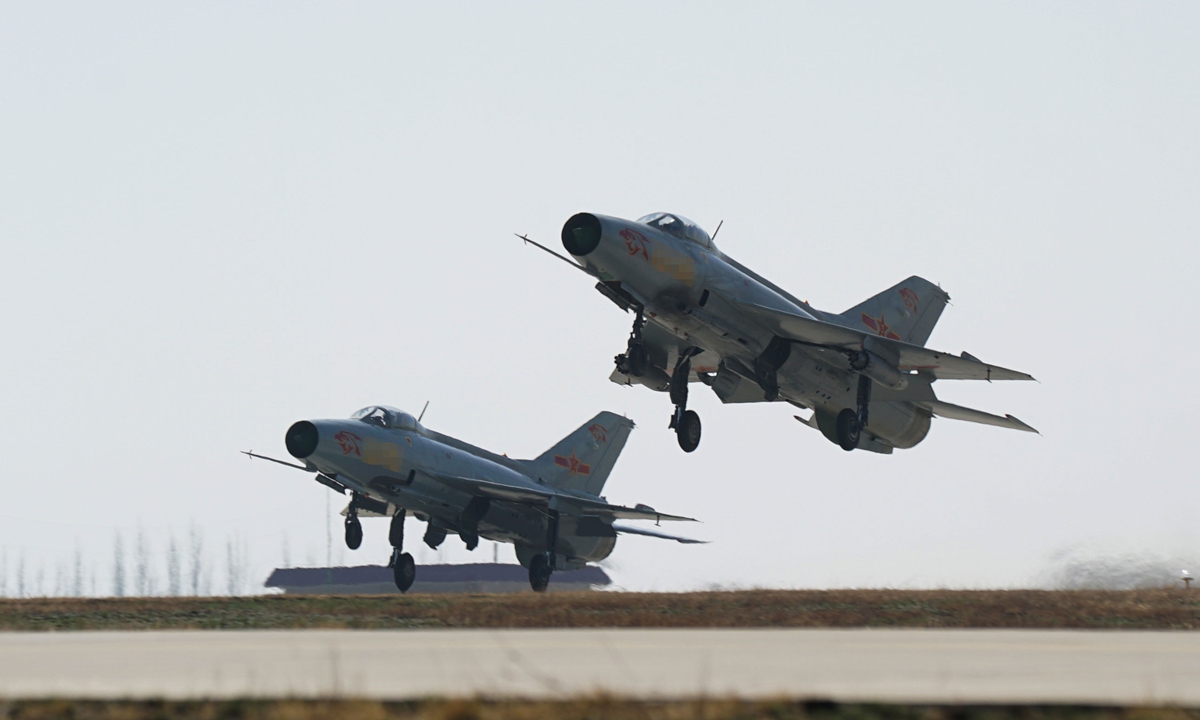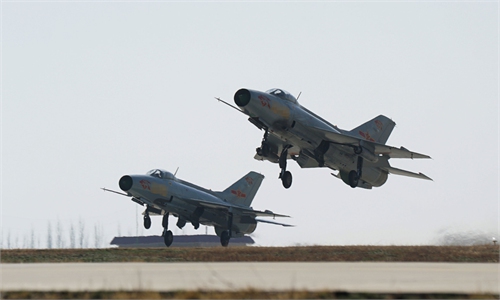beijingwalker
ELITE MEMBER

- Joined
- Nov 4, 2011
- Messages
- 65,195
- Reaction score
- -55
- Country
- Location
China expected to retire legacy J-7 fighter jets from combat service this year in 2023
By Liu Xuanzun
Global Times
Published: Jan 29, 2023 09:31 PM

Two J-7 fighter jets attached to an aviation brigade of the air force under the PLA Western Theater Command take off simultaneously for a live-fire flight training exercise on March 22, 2018.Photo:China Military
With the Chinese aviation industry building advanced fighter jets at an increasing pace, the country has been retiring its J-7 fighter jets since 2018, and the legacy aircraft could be completely decommissioned from the Chinese People's Liberation Army (PLA) Air Force this year, experts said on Sunday.
In recent years, the PLA Air Force has received lots of new equipment, with many units switching to fly advanced, domestically developed fighter jets, reaching new levels in both aircraft and pilot training, the China Central Television (CCTV) reported on Saturday.
At the same time, legacy equipment is being steadily decommissioned, including the J-7, the first supersonic fighter jet developed by China that can reach Mach 2. This type of second-generation fighter jet was used by the PLA Air Force and the aviation force of the PLA Navy, the CCTV report said.
The complete decommissioning procedure of the J-7 was initiated in 2018, and units that still fly the jet will accelerate this process this year, CCTV said.
China's production capacity of new aircraft has been increasing, and the number of J-7 fighter jets remaining in active service is now low, Du Wenlong, a Chinese military expert, said in the report.
According to this fast pace, the J-7 will likely be retired from combat service of the PLA Air Force this year, Du said.
China has been building 4.5-generation fighter jets like the J-10C and J-16 as well as the fifth-generation fighter jet J-20 in large numbers, and they will eventually replace legacy fighter jets like the J-7, experts said.
As of the end of December last year, major Chinese military aircraft manufacturers announced completion of their annually scheduled production plans, which observers said laid a solid foundation for the aviation forces of the PLA in 2023.
Wei Dongxu, a Chinese military expert, told the Global Times that the J-7 fighter jets significantly contributed to China's air defense, and many variants including the JL-9 trainer jet were developed based on the J-7.
The J-7 also sold well on the international market, Wei said.
The retired J-7s could be reserved for training and testing, or they could be modified to become drones and play new roles in modern warfare, analysts said.
J-7 fighter jets were among the PLA aircraft that were spotted flying near the island of Taiwan in an exercise in June 2021, said the defense authority on the island at the time, specifically noting that those J-7s were not drones.
By Liu Xuanzun
Global Times
Published: Jan 29, 2023 09:31 PM

Two J-7 fighter jets attached to an aviation brigade of the air force under the PLA Western Theater Command take off simultaneously for a live-fire flight training exercise on March 22, 2018.Photo:China Military
With the Chinese aviation industry building advanced fighter jets at an increasing pace, the country has been retiring its J-7 fighter jets since 2018, and the legacy aircraft could be completely decommissioned from the Chinese People's Liberation Army (PLA) Air Force this year, experts said on Sunday.
In recent years, the PLA Air Force has received lots of new equipment, with many units switching to fly advanced, domestically developed fighter jets, reaching new levels in both aircraft and pilot training, the China Central Television (CCTV) reported on Saturday.
At the same time, legacy equipment is being steadily decommissioned, including the J-7, the first supersonic fighter jet developed by China that can reach Mach 2. This type of second-generation fighter jet was used by the PLA Air Force and the aviation force of the PLA Navy, the CCTV report said.
The complete decommissioning procedure of the J-7 was initiated in 2018, and units that still fly the jet will accelerate this process this year, CCTV said.
China's production capacity of new aircraft has been increasing, and the number of J-7 fighter jets remaining in active service is now low, Du Wenlong, a Chinese military expert, said in the report.
According to this fast pace, the J-7 will likely be retired from combat service of the PLA Air Force this year, Du said.
China has been building 4.5-generation fighter jets like the J-10C and J-16 as well as the fifth-generation fighter jet J-20 in large numbers, and they will eventually replace legacy fighter jets like the J-7, experts said.
As of the end of December last year, major Chinese military aircraft manufacturers announced completion of their annually scheduled production plans, which observers said laid a solid foundation for the aviation forces of the PLA in 2023.
Wei Dongxu, a Chinese military expert, told the Global Times that the J-7 fighter jets significantly contributed to China's air defense, and many variants including the JL-9 trainer jet were developed based on the J-7.
The J-7 also sold well on the international market, Wei said.
The retired J-7s could be reserved for training and testing, or they could be modified to become drones and play new roles in modern warfare, analysts said.
J-7 fighter jets were among the PLA aircraft that were spotted flying near the island of Taiwan in an exercise in June 2021, said the defense authority on the island at the time, specifically noting that those J-7s were not drones.







